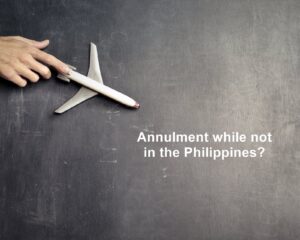Annulment or nullity of marriage case while overseas

With the new rules, Filipinos seeking annulment while overseas is now possible
It is now easier to file an annulment or nullity of marriage case while overseas because of changes to the rules of procedure issued by the Supreme Court.
The rules used to require that a case for annulment or nullity of marriage cases should be filed with the Family Court of the city or province where one of the spouses had lived for the last 6 months.
Those rules allowed a case to be filed if at least one of the spouses lives in the Philippines.
However, they made it impossible if both spouses were based overseas due to working abroad or having immigrated there.
This has changed.
The Supreme Court has relaxed the residency requirements. The amended rules now allow filing of an annulment or nullity of marriage case even if both spouses are abroad.
The new rules are embodied in the Supreme Court’s Administrative Circular 02-11-10-SC dated January 24, 2023.
What are the residency requirements for annulment or nullity of marriage?

It allows spouses overseas the ability to have an annulment even if both are abroad
The new rules allow a petitioner to file for annulment or nullity of marriage even if both spouses have been living abroad.
The rules now allow the case to be tried by the Family Court in the city or province:
- where either spouse has been living at least six (6) months
- where the respondent spouse may happen to be found in the Philippines if the respondent spouse does not live in the Philippines
But if both spouses are overseas, the case can also be filed with the Family Court of the city or province that is the habitual residence of either spouse, according to the choice of the Petitioner, OR the Philippine city or province where the spouses last lived together as husband and wife.
That means that an annulment or nullity of marriage case can be filed even if both spouses are no longer living in the Philippines.
It can be filed in the city or province here where the couple last lived together.
How do you prove residency in an annulment or nullity of marriage case while overseas?

Billings with the address can be used as a proof of residence
When you file a Petition for annulment or nullity of marriage, it must state the complete address of the spouses. The Petition also must include proof of the stated addresses. What proof is necessary depends on the circumstances of the couple.
- In the most typical situations, the case is filed with the Family Court of the city or province of residence of either spouse.
In such situations, the requirements to prove residence are:
- Sworn certificate of residence issued by the barangay. This certificate must be accompanied with a house location sketch.
- A sworn statement by the petitioner’s lawyer of his having verified the authenticity of the proof that the petitioner had indeed been residing in the barangay for at least six months before the filing the petition.
- This sworn statement must also declare that the lawyer has sufficiently explained to the petitioner both the reason for the residency requirement with respect to where the case should be filed and the consequences of not complying with that residency requirement.
- Supporting documents such as: utility bills for the last 6 months prior to the filing of the Petition, government or company issued IDs bearing the petitioner’s photograph and address issued at least 6 months prior to filing the Petition, notarized lease contract and/or receipts for rental payments, and land titles and the like covering the place of residence in the name of the petitioner.

Domestic abuse can be a ground for annulment that exempts residency requirements
- In certain situations, the petitioner spouse is exempted from submitting those residency requirements if he or she left the marital home for just cause. Examples of such just cause are respondent spouse’s violence against the petitioner or their children, drug addiction, infidelity, and respondent spouse’s failure to provide support. The just cause should be cited in her verification and detailed in the petition.
- If both spouses are overseas, the following proof of residence are required:
- A sworn certification from the Philippine Consulate abroad that the petitioner is temporarily residing abroad for employment, business, education, or any other purpose;
- Any sufficient proof of the habitual residence of any of the parties or the place where they last resided as husband and wife; and
- A sworn statement by petitioner’s lawyer that the latter sufficiently explained to the petitioner both the reason for the residency requirement and the consequences of not complying with that requirement.
What are the consequences of claiming a false residence in an annulment or nullity of marriage case?

Your lawyer also risks getting a penalty for submitting false information to the court
The case will be dismissed if, at any stage of the proceedings, the court discovers that a false address or a false claim for exemption for the residency requirement was made.
Furthermore, the court will require Petitioner’s lawyer to explain why the latter should not be sanctioned for submitting a false affidavit of verification.
How might the court discover that a false address was provided?

The prosecutor under the DOJ conducts an investigation that usually requires personal appearance of both spouses
After an annulment or nullity of marriage case is filed, the Family Court will direct the city or provincial prosecutor to investigate if there is collusion between the spouses to manufacture or misrepresent the legal grounds for dissolving the marriage.
As part of this investigation, the court orders the prosecutor to report a determination of the party’s residence.
Furthermore, to acquire jurisdiction over the parties and commence trial, the court will first issue formal service of summons to the spouses.
The court sheriff or process server typically carries out the service.
The Petition will be dismissed if they discover that the summons for a case filed in the respondent’s alleged city or province of residence cannot be served because the respondent does not actually reside at the address provided by the Petitioner.
How is an Annulment trial conducted when one or both spouses are overseas?

Service of summons can be through the Hague Service Convention (although this is can be very dificult) or through a private courier depending on the court’s discretion.
An Annulment trial can proceed if both spouses are overseas if summons is properly served.
If the respondent is in the Philippines, summons to him or her is served in accordance with the usual Rules of Court. This is typically carried out by the court sheriff or process server.
If the respondent is overseas, the Family Court will require summons in accordance with the Hague Service Convention, a treaty to which the Philippines and many other countries are signatories. In such cases, the Family Court will send its summons to a Central Authority the foreign country designated under the treaty. The foreign Central Authority shall then send back to the court a certification on whether the summons was served and the manner in which this was done.
Trial can commence once service of summons has been confirmed.
During trial, evidence must be presented to the court to prove that the marriage is void. Chief among this evidence is the testimony of the spouse who filed the case. Testimony is typically done in court and in person. The Petitioner must go to court at a time and day calendared for receiving her testimony. This usually requires being in the Philippines on that particular day.
However, since the pandemic, the Supreme Court has given trial courts authority to receive remote, video conference testimony.
It is possible to request that court allow the Petitioner to testify through video conference from a Philippine consulate abroad.

Video conference hearing if abroad can only be done on Philippine Embassy premises and if the judge agrees
If the court approves this request, the lawyer can coordinate with the Philippine consulate to schedule the video conference on the day calendared by the court. [Supreme Court Administrative Matter No. 20-12-01-SC (Re: Proposed Guidelines on the Conduct of Videoconferencing) dated December 9, 2020]
Please note however, that the judge has final say. He may require you to personally come for testimony.
Additionally –
Note that the public prosecutor is, at the outset of a case, tasked to investigate if the spouses are colluding with each other.
As part of this investigation, the prosecutor typically requires the Petitioner to appear at their office for interview. That occasion requires the Petitioner to come to the Philippines in person unless the prosecutor agrees that the interview be done through video conference.
These mean that it is possible to complete the case even if the Petitioner is abroad for the entirety of the case provided that both the prosecutor and the court approve.
In practice, this means that it is possible but NOT GUARANTEED that the spouses do not have to come physically to the court.
This article is meant as a general discussion. To discuss your particular situation, contact us through this website.






0 Comments